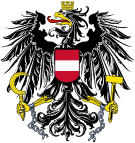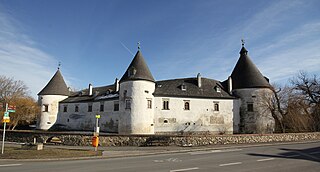| This article is part of a series on the |
| Politics of Austria |
|---|
 |
|
|
|
|
Local and mayoral elections were held in the Austrian state of Burgenland on 7 October 2007. The date was decided on by Franz Steindl (ÖVP), who is responsible for elections as the deputy governor of Burgenland. The elections were held in only 170 of the 171 municipalities of Burgenland because Steinberg-Dörfl had held early elections in 2006.

Austria, officially the Republic of Austria, is a country in Central Europe comprising 9 federated states. Its capital, largest city and one of nine states is Vienna. Austria has an area of 83,879 km2 (32,386 sq mi), a population of nearly 9 million people and a nominal GDP of $477 billion. It is bordered by the Czech Republic and Germany to the north, Hungary and Slovakia to the east, Slovenia and Italy to the south, and Switzerland and Liechtenstein to the west. The terrain is highly mountainous, lying within the Alps; only 32% of the country is below 500 m (1,640 ft), and its highest point is 3,798 m (12,461 ft). The majority of the population speaks local Bavarian dialects as their native language, and German in its standard form is the country's official language. Other regional languages are Hungarian, Burgenland Croatian, and Slovene.

Austria is a federal republic made up of nine states, known in German as Länder. Since Land is also the German word for "country", the term Bundesländer is often used instead to avoid ambiguity. The Constitution of Austria uses both terms. Even though English "land" is a cognate, the term (Bundes)land is commonly rendered as "state" or "province" by tradition in English writing.

Burgenland (German pronunciation: [ˈbʊʁɡn̩lant]; Hungarian: Őrvidék; Croatian: Gradišće; Slovene: Gradiščanska; Czech: Hradsko; is the easternmost and least populous state of Austria. It consists of two statutory cities and seven rural districts, with in total 171 municipalities. It is 166 km long from north to south but much narrower from west to east. The region is part of the Centrope Project.
Apart from the SPÖ, the ÖVP, the Greens and the FPÖ, the former leader of the Freedom Party in Burgenland, Wolfgang Rauter, will stand with a split from the FPÖ, the Free Citizens' List (German : Plattform Freie Bürgerlisten, FBL), instead. The FPÖ's goal for the election initially were 70 local councillors or more (this goal was later raised to "90 or more"), while the SPÖ wants to improve on its "record achievement" of 94 mayors in the 2002 elections. The BZÖ did not contest this election.

The Freedom Party of Austria is a right-wing populist and national-conservative political party in Austria. The party, led by Heinz-Christian Strache, is a member of the Europe of Nations and Freedom group in the European Parliament, as well as of the Movement for a Europe of Nations and Freedom.

German is a West Germanic language that is mainly spoken in Central Europe. It is the most widely spoken and official or co-official language in Germany, Austria, Switzerland, South Tyrol (Italy), the German-speaking Community of Belgium, and Liechtenstein. It is also one of the three official languages of Luxembourg and a co-official language in the Opole Voivodeship in Poland. The languages which are most similar to German are the other members of the West Germanic language branch: Afrikaans, Dutch, English, the Frisian languages, Low German/Low Saxon, Luxembourgish, and Yiddish. There are also strong similarities in vocabulary with Danish, Norwegian and Swedish, although those belong to the North Germanic group. German is the second most widely spoken Germanic language, after English.
Participation was 82.93%, a slight decrease, and results were:
- SPÖ: 92,225 votes (–1,184), 47.70% (–1.26), 1,537 local councillors (–19), 88 mayors (–7)
- ÖVP: 83,286 votes (+974), 43.07% (–0.07), 1,368 local councillors (+25), 78 mayors (+6)
- FPÖ: 5,680 votes (–4,023), 2.94% (–2.15), 53 local councillors (–43), 0 mayors (–1)
- FBL: 3,607, 1.87%, 30 local councillors, 1 mayor
- Grüne: 2,626 votes (–833), 1.36% (+0.42), 19 local councillors (+6), 0 mayors (±0)
- Others: 5,938 votes (+2,350), 3.07% (+1.19), 91 local councillors (+24), 4 mayors (+1)
Run-off mayoral elections were held in eight municipalities on 21 October 2007; seven candidates were from ÖVP and SPÖ, respectively, two from local lists. The SPÖ lost both of their mayoral positions in the run-off elections, losing one to the ÖVP (who held their other five) and one to a local list.
The election was declared invalid in Wiesen, as one of the candidates of an independent list (Unabhängige Liste Wiesen, ULW; "Independent List Wiesen") did not have passive suffrage since he did have his residence in the municipality; ULW got 12.8% of the vote and 3 seats in the municipal council in the election. The election was questioned by the SPÖ. [1]












